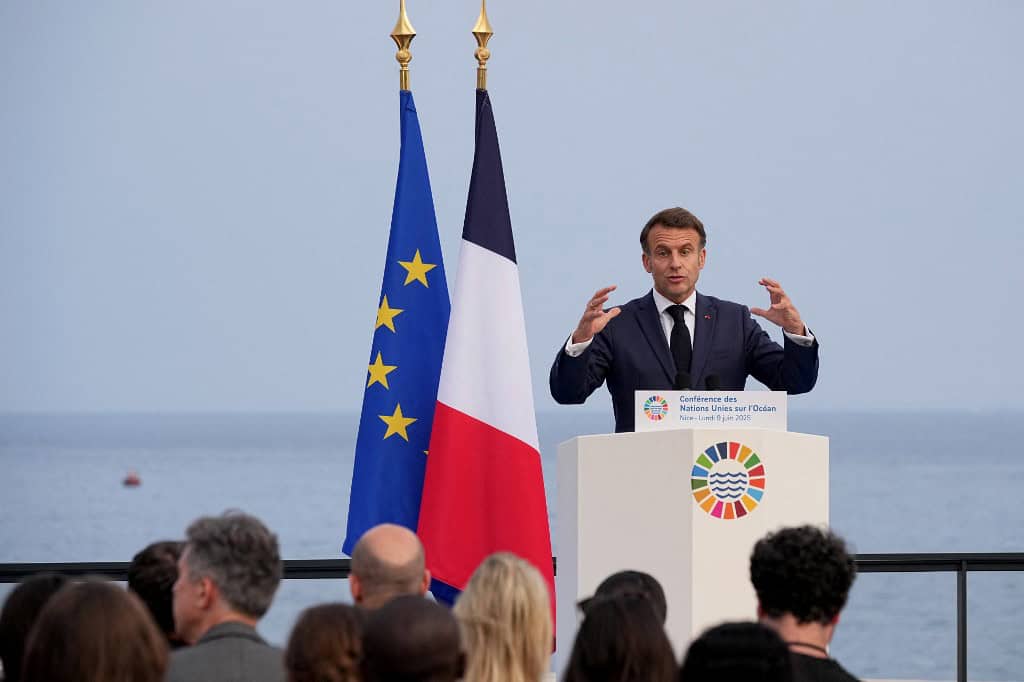The UN Ocean Summit concluded in Nice with advances in protecting the high seas—but without any clear financial commitments. After bringing together around 60 world leaders, the summit also ended with tougher warnings against deep-sea mining. Environmental advocates and leaders from island nations, however, criticized what they see as backsliding on fossil fuels and expressed disappointment over limited progress in marine area protection.
Full Speed Ahead for the High Seas
Widely celebrated, the ratification of the High Seas Treaty by around 50 countries—formalized Monday in Nice—offers hope for the rapid entry into force of this international agreement, which aims to strengthen protections for international waters (beyond 200 nautical miles or 370 kilometers from shore).
Rebecca Hubbard of the High Seas Alliance, a coalition of about 50 NGOs, hailed it as an “incredible breakthrough.” But “we must keep our foot on the gas,” she warned, since the treaty will only take effect 120 days after the 60th ratification is deposited. France was unable to reach that key number in Nice, as French President Emmanuel Macron had hoped.
Still, “there’s been an incredible mobilization,” said Romain Troublé, director of the Tara Ocean Foundation. “A real acceleration,” echoed François Chartier of Greenpeace. “The treaty should be finalized before the end of the year, and we can begin work on the first marine protected areas in the high seas,” he added.
Harsh Criticism of Deep-Sea Mining
From the summit’s outset, global leaders took a harsher stance against former U.S. President Donald Trump’s unilateral decision to begin mining polymetallic nodules in international waters of the Pacific. “The deep sea is not for sale,” declared Emmanuel Macron, calling it “madness” and a “predatory economic action,” while UN Secretary-General António Guterres warned against a new “Wild West.”
Still, this strong rhetoric failed to significantly expand the coalition calling for a moratorium on deep-sea mining—from 32 to just 37 countries out of the 169 members of the International Seabed Authority (ISA), which is tasked with drafting a mining code.
More (and Better) Marine Protected Areas
From Colombia to Samoa, and Portugal to Greece, countries around the world announced either the creation of new Marine Protected Areas (MPAs) or the strengthening of existing ones—particularly by banning bottom trawling. The global share of ocean designated as protected areas could exceed 10% by the end of the summit, up from the previous 8.34%.
However, France’s limited measures—restricting bottom trawling in only 4% of its metropolitan waters—disappointed environmental NGOs.
Silence on Fossil Fuels
Despite being the main cause of global warming, fossil fuels (gas, oil, and coal) were not mentioned in the final draft declaration expected to be adopted Friday. The document refers only to the “harmful effects of climate change” on oceans and ecosystems but does not explicitly call for a transition away from fossil fuels—unlike the COP28 agreement in Dubai in 2023.
“It’s the primary driver of ocean degradation, and we’re not talking about it enough. That’s regrettable,” said Ralph Regenvanu, Environment Minister of Vanuatu, a volcanic Pacific archipelago. Meanwhile, the $100 billion in funding mentioned by Costa Rica prior to the summit never materialized. According to a 2022 World Economic Forum report, an estimated $175 billion per year is needed to meet the Sustainable Ocean Development Goal by 2030.






